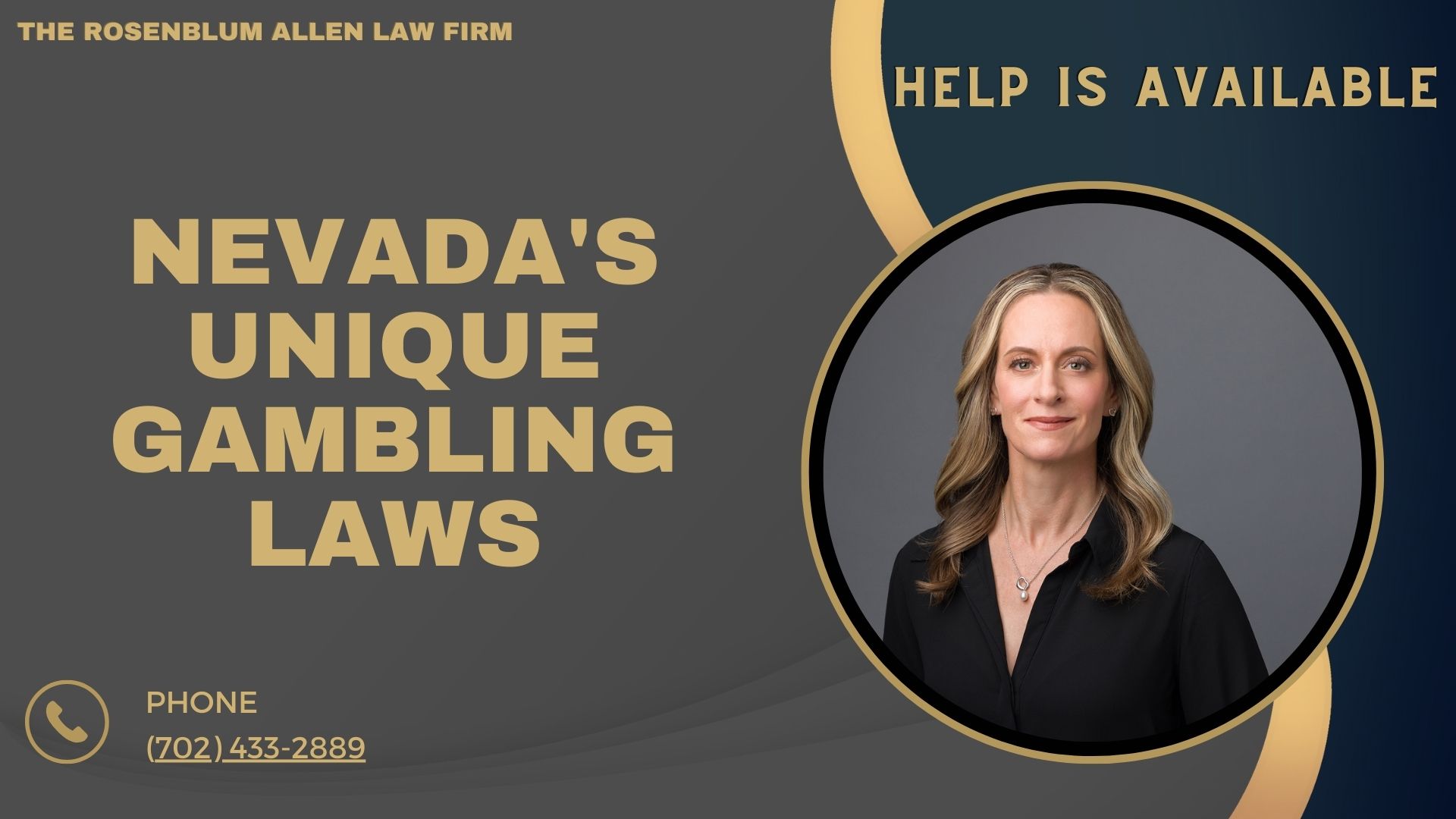Nevada is known for its vibrant gambling scene, with Las Vegas at the heart of it all. But the state’s gaming laws are more than just a backdrop to the glitz and glamour of the Strip. They form a complex web of regulations that both residents and tourists need to understand. This guide breaks down the essentials of Nevada’s unique gaming laws, covering what you need to know whether you’re a local or just visiting.
Understanding Nevada’s Gambling Laws
Nevada has one of the most developed gambling regulations in the world. While the state is often seen as the gambling capital, there are specific rules that everyone needs to follow. Here’s a look at some of the core principles:
- Age Restrictions
In Nevada, the legal age to gamble in casinos is 21. This applies to all forms of gambling, including slot machines, table games, sports betting, and poker rooms.
- Why It Matters: Casinos strictly enforce age restrictions. Even if you’re walking through, minors are not allowed to loiter in gaming areas.
- Identification: Be prepared to show a valid ID if you look younger than 30.
- Types of Legal Gambling
Nevada’s laws allow various forms of gambling. Understanding what’s legal can enhance your experience while avoiding any pitfalls.
- Casino Games: This includes slots, blackjack, poker, roulette, and other popular games.
- Sports Betting: Nevada was the first state to legalize sports betting, regulated through licensed sportsbooks.
- Online Gambling: Only poker is allowed online within Nevada’s borders.
- Lottery: Due to constitutional restrictions, Nevada does not have a state lottery.
- Licensing and Regulations
All gambling operations in Nevada are heavily regulated. The Nevada Gaming Control Board (NGCB) and Nevada Gaming Commission oversee licensing, compliance, and enforcement.
- Casino Licensing: Only licensed entities can offer gaming services.
- Background Checks: Stringent background checks are conducted on owners, key employees, and significant investors.
- Regulatory Compliance: Casinos must adhere to strict payouts, game fairness, and anti-money laundering regulations.
What Tourists Should Know
Nevada’s gambling laws aren’t just for residents; they equally bind tourists. Here’s what every visitor needs to keep in mind:
- Casino Etiquette and Rules
Navigating a casino for the first time can be overwhelming. Beyond just knowing how to play, understanding the basic rules and etiquette is critical:
- Tipping Dealers: It’s customary to tip dealers, especially if you’re winning.
- No Photography: Most casinos do not allow photography on the gaming floor.
- Handling Chips: Only touch your chips. Once bets are placed, don’t touch them again until the dealer has settled the hand.
- Tax Implications for Winnings
Tourists, especially those from outside the U.S., should be aware of tax implications:
- Reporting Winnings: U.S. citizens must report gambling winnings as income on their tax returns.
- Withholding for Non-U.S. Citizens: Non-U.S. citizens may have up to 30% withholding on significant winnings.
- Keeping Records: It’s wise to keep track of your wins and losses, which can help with tax reporting and offsetting gains.
Resident-Specific Gambling Rules
While Nevada is known for its tourist appeal, residents must also navigate specific rules that impact their daily lives. Understanding these laws helps locals adhere to regulations while enjoying the perks of living in the gambling capital.
- Local Gambling Restrictions
Not all gambling activities are open to residents in the same way they are to tourists. Here’s what locals should keep in mind:
- Home Games: Residents can host home poker games, but they must not charge a fee or take a cut of the winnings. The game must be purely social.
- Online Gambling: While tourists might see ads for online casinos, Nevada residents can only legally participate in state-regulated online poker.
- Workplace Betting Pools: Office betting pools (like those for sports) are technically illegal, even though they are often considered harmless fun.
- Self-Exclusion Programs
Nevada offers self-exclusion programs for those struggling with gambling addiction. Residents can voluntarily ban themselves from casinos and receive help.
- How It Works: Individuals sign up to be excluded from gaming activities and are legally barred from collecting winnings.
- Commitment: Exclusions can be temporary or permanent, offering a personalized approach to responsible gambling.

Casino Regulations: Ensuring Fair Play
Nevada’s casinos operate under a strict set of rules designed to ensure fair and transparent games. These regulations are meant to protect both players and the integrity of the gaming industry.
- Game Fairness and Audits
Casinos must adhere to strict standards to ensure that all games are fair:
- Regular Audits: The NGCB regularly audits casinos to ensure compliance with regulations.
- Payout Percentages: Slot machines have minimum payout percentages, ensuring they are not rigged against players.
- Surveillance: Casinos are required to have extensive surveillance systems to monitor gaming areas and detect fraud or cheating.
- Anti-Money Laundering Measures
Nevada casinos must comply with federal anti-money laundering laws to prevent illicit activities:
- Transaction Reporting: Any transaction over $10,000 must be reported to the IRS.
- Suspicious Activity: Casinos are required to report suspicious transactions that could indicate money laundering or fraud.
- Customer Identification: High-value players may be required to provide identification when making large transactions.
Tourist Gambling Rules: Avoiding Common Pitfalls
Tourists flock to Nevada for the gambling experience, but understanding the rules can help avoid trouble. Here’s what every visitor should know to make the most of their trip.
- Credit and Casino Markers
Many tourists use casino credit (markers) to gamble, but it’s essential to understand how these work:
- How Markers Work: Casino markers are interest-free loans that must be repaid within a set timeframe.
- Consequences of Non-Payment: Failure to repay markers is treated as a criminal offense in Nevada, potentially leading to prosecution.
- Know Your Limits: Only use markers if you’re confident in your repayability. Stick to your budget.
- Gambling While Intoxicated
It’s easy to get carried away when free drinks are flowing, but gambling while intoxicated can lead to poor decisions:
- Casino Policies: Casinos can refuse service or ask you to leave if they believe you’re too intoxicated to gamble responsibly.
- Legal Implications: Gambling losses while intoxicated are generally not refundable. Stay in control to keep your experience fun and safe.

Legal Gambling in Nevada: What’s Allowed and What’s Not
Nevada’s reputation as the world’s gambling capital doesn’t mean everything goes. The state has clear rules on what forms of gambling are allowed and which are off-limits. Knowing the boundaries helps you enjoy your gaming experience without crossing the line.
- Permitted Forms of Gambling
Nevada offers a broad range of legal gambling activities, each with its own set of rules:
- Casino Games: All the classics—slots, blackjack, roulette, craps, and poker—are legal in licensed casinos.
- Sports Betting: Nevada was the pioneer in legal sports betting. You can bet on almost any sport through licensed in-person and online sportsbooks within state lines.
- Horse Racing: Parimutuel betting on horse races is allowed and regulated, adding another layer of entertainment for visitors and residents alike.
- Online Poker: The only form of online gambling currently legal in Nevada, but state-licensed platforms must operate it.
- Illegal Gambling Activities
Even in Nevada, some gambling activities are strictly prohibited. Engaging in these could lead to legal trouble:
- Unlicensed Games: Any gambling outside licensed venues, including underground poker games and unregistered slot machines, is illegal.
- Street Betting: Betting on street games like dice or cards, often known as “Craps on the Corner,” is illegal.
- Dog Fighting or Animal Betting: Any gambling involving animal fighting is illegal and subject to severe penalties.
Responsible Gambling: Tools and Resources
Gambling should be fun, but it’s important to recognize when it’s becoming a problem. Nevada provides resources to help people manage their gambling habits responsibly.
- Setting Limits
Setting personal limits on time and money spent gambling can keep things under control:
- Daily Budget: Decide on a budget before you hit the casino. Stick to it, and avoid dipping into other funds.
- Time Management: Set a time limit for your gambling activities. It’s easy to lose track of time, especially in a casino with no clocks or windows.
- Problem Gambling Resources
If gambling becomes more than just entertainment, Nevada has several resources available:
- Nevada Council on Problem Gambling: Offers support, counseling, and resources for those struggling with gambling addiction.
- Gamblers Anonymous (GA): A support group providing meetings and guidance for those seeking help.
- Self-Exclusion: As mentioned earlier, the self-exclusion program allows individuals to ban themselves from casinos to help manage their gambling.
Impact of Casino Regulations on Residents and Tourists
Nevada’s stringent casino regulations are designed to protect both residents and tourists. These laws ensure a fair and safe environment for all players.
- Consumer Protections
Nevada’s gaming regulations provide several protections for consumers, making sure that everyone is playing on a level field:
- Game Transparency: Casinos must clearly display each game’s rules. Don’t hesitate to ask the dealer or staff if you don’t understand something.
- Security and Surveillance: High-tech surveillance systems monitor casinos 24/7 to protect patrons and prevent cheating.
- Payout Assurance: Casinos are obligated to pay out winnings promptly. If you encounter an issue, the NGCB can intervene.
- Economic Impact
Gambling isn’t just about fun; it’s a significant part of Nevada’s economy. Here’s how it affects residents:
- Job Creation: The gaming industry provides thousands of jobs for locals, from dealers to hotel staff to regulators.
- Tourism Boost: Tourists flock to Nevada for its gambling, boosting local businesses and contributing to state revenue.
- Community Contributions: Many casinos are involved in local charities and community projects, giving back to the areas they operate in.
Penalties for Breaking Gambling Laws
Nevada takes its gambling laws seriously. Breaking the rules can lead to significant penalties for residents and tourists. Understanding these consequences helps you stay out of trouble and ensures your gaming experience remains enjoyable.
- Common Offenses and Penalties
There are several ways you can find yourself on the wrong side of Nevada’s gambling laws. Here are some of the most common offenses and their potential penalties:
- Underage Gambling: Anyone caught gambling under the age of 21 can face fines, community service, and a ban from the casino. The establishment can also be penalized.
- Cheating or Fraud: This includes manipulating slot machines, card counting in a way that breaks casino rules, or using devices to predict game outcomes. Depending on the severity, penalties range from fines to imprisonment.
- Non-Payment of Casino Markers: Failure to repay casino markers is a criminal offense. Consequences can include heavy fines, court appearances, and even jail time.

The Future of Gambling in Nevada
Nevada’s gaming industry is constantly evolving. As technology advances and new trends emerge, the state continues to adapt its laws to stay ahead. Here’s what the future might hold.
- The Rise of Online and Mobile Gambling
Online gambling, particularly mobile sports betting, is increasing in Nevada. While traditional casino games remain popular, more players gamble on their phones.
- Current Status: Online poker is Nevada’s only fully legalized online gambling form. However, mobile sports betting is booming, with apps available from major sportsbooks.
- Potential Changes: There’s ongoing discussion about expanding online gambling to include more casino-style games, but strict regulations and concerns about addiction are significant hurdles.
- Innovation in Casino Technology
Nevada’s casinos are increasingly embracing new technology to enhance the gaming experience:
- Cashless Gaming: Some casinos now offer cashless betting options, allowing players to use digital wallets or mobile apps to place bets.
- Skill-Based Games: To attract younger players, casinos are adding skill-based games that combine traditional gaming with elements of video games.
- Augmented Reality (AR) and Virtual Reality (VR): Emerging technologies like AR and VR are being explored to create immersive gambling experiences, potentially changing how games are played.

Breaking It All Down
Nevada’s unique gaming laws are a big part of the state’s uniqueness. Whether you’re a tourist looking to have fun on the Strip or a resident enjoying a night out, understanding these laws helps ensure a positive experience.
The rules may seem complex, but they are designed to protect players and maintain the industry’s integrity. From knowing which games are legal to understanding the penalties for breaking the rules, being informed keeps the focus on fun. And as Nevada continues to innovate, staying up-to-date with these changes will keep you ahead of the game.
Remember, gambling should always be enjoyed responsibly. Set your limits, know the rules, and enjoy the thrill that only Nevada can offer.

Frequently Asked Questions
Can I use my phone at the casino tables in Nevada?
Most casinos have strict rules against using phones at the tables. You can have your phone with you, but avoid taking calls, texting, or taking photos while at the table, as this can lead to warnings or being asked to leave.
Are casino winnings taxed in Nevada?
While Nevada doesn’t impose a state income tax on gambling winnings, all U.S. residents must report their winnings on their federal tax returns. Non-U.S. residents may have winnings withheld at the casino.
Is smoking allowed in Nevada casinos?
Yes, most casinos in Nevada allow smoking on the gaming floor, though many offer designated non-smoking areas. Some newer properties are smoke-free, so check the casino’s policy if this is important.
Can I place a sports bet outside Nevada using a Nevada sportsbook app?
No, even if you have a Nevada-based sportsbook app, you must be physically within Nevada state lines to place a sports bet. Location tracking technology ensures compliance.
Are there dress codes in Nevada casinos?
While most casinos don’t enforce strict dress codes, upscale venues may require smart casual attire, especially in VIP areas or fine dining establishments. It’s best to check ahead if you plan on visiting high-end spots.
Can I bring my alcohol into a casino?
Bringing outside alcohol into casinos is generally prohibited. However, free drinks are often offered to those actively gambling, and beverages can be purchased at bars within the casino.
Is it legal to gamble in a Nevada casino 24/7?
Yes, most Nevada casinos are open 24 hours a day, seven days a week. This round-the-clock operation is one of the attractions that make Las Vegas unique.
What happens if I win big and the casino refuses to pay?
If you encounter a dispute over winnings, you can file a complaint with the Nevada Gaming Control Board. They investigate conflicts between players and casinos and can help resolve the issue.
Can tourists gamble at Native American casinos in Nevada?
Yes, tourists can gamble at Native American casinos, which operate under federal regulations and specific agreements with the state. These casinos often offer a different experience compared to those on the Strip.
Is it safe to walk around with large sums of cash in a casino?
While casinos have extensive security, it’s still wise to exercise caution. Use casino services like safety deposit boxes or ask for an escort to your car or hotel room if you’re carrying significant winnings.
How does Nevada regulate skill-based games in casinos?
Skill-based games, which combine traditional gambling with elements of video games, are regulated like other games of chance. They must be licensed and tested for fairness to ensure they meet state standards.

Additional Resources for You from The Rosenblum Allen Law Firm.
Our lead attorney, Molly Rosenblum Allen, Esq., has created a wealth of resources to support you during times of need. Whether you’re dealing with specific gambling-related legal issues or seeking guidance on Nevada’s complex gaming laws, these resources offer valuable insights and advice:
Underage Gambling: Understand the legal consequences and protections in place for underage gambling in Nevada.
Gambling Debt Collection Crimes: Learn about the legal ramifications of gambling-related debt collection and how it can impact you.
Gambling Violations: A comprehensive guide to common gambling violations and how they are prosecuted in Nevada.
Marked Cards: Discover the legal implications of marked cards and other forms of cheating at the casino.
Pinching Bets: Explore the consequences of altering or withdrawing bets during a game, a practice known as pinching bets.
Past Posting: Gain insights into the crime of past posting—placing bets after the outcome is known—and its severe penalties.
Unlawful Acts Regarding Gaming Equipment: This resource covers illegal actions involving gaming devices and equipment, ensuring you know what’s prohibited.
Sports Betting Fraud: Learn how sports betting fraud is identified and prosecuted, and what you need to know to stay compliant.
Gaming Fraud Charges: A detailed look at charges related to gaming fraud, including the legal processes and potential defenses.

Offsite Resources for You
American Gaming Association (AGA): The AGA is the premier national trade group representing the U.S. casino industry. Their website offers resources on responsible gaming, industry regulations, and legal updates.
National Council on Problem Gambling (NCPG): NCPG provides support for individuals struggling with gambling addiction. They offer resources on treatment options, prevention programs, and helplines.
Gamblers Anonymous (GA): A fellowship of individuals who share their experiences and support one another in overcoming gambling addiction. Find meetings and support resources on their website.
Casino.org: A comprehensive guide to casinos and gambling, offering insights into casino games, tips for responsible gambling, and industry news.
Responsible Gaming Resource Center (RGRC): An online hub dedicated to promoting responsible gaming practices, providing tools for self-assessment, and resources for those needing help.

A Special Message from Our Lead Attorney, Molly Rosenblum Allen, Esq

Thank you for taking the time to read through our resources. I hope you found the information helpful as you navigate your family law challenges. We know that international custody issues can be overwhelming, and my team and I are here to support you every step of the way. If you’re ready to take the next step, call us at (702) 433-2889. We look forward to helping you get started on finding the right path for your situation.
Best regards,
Molly Rosenblum Allen, Esq.






